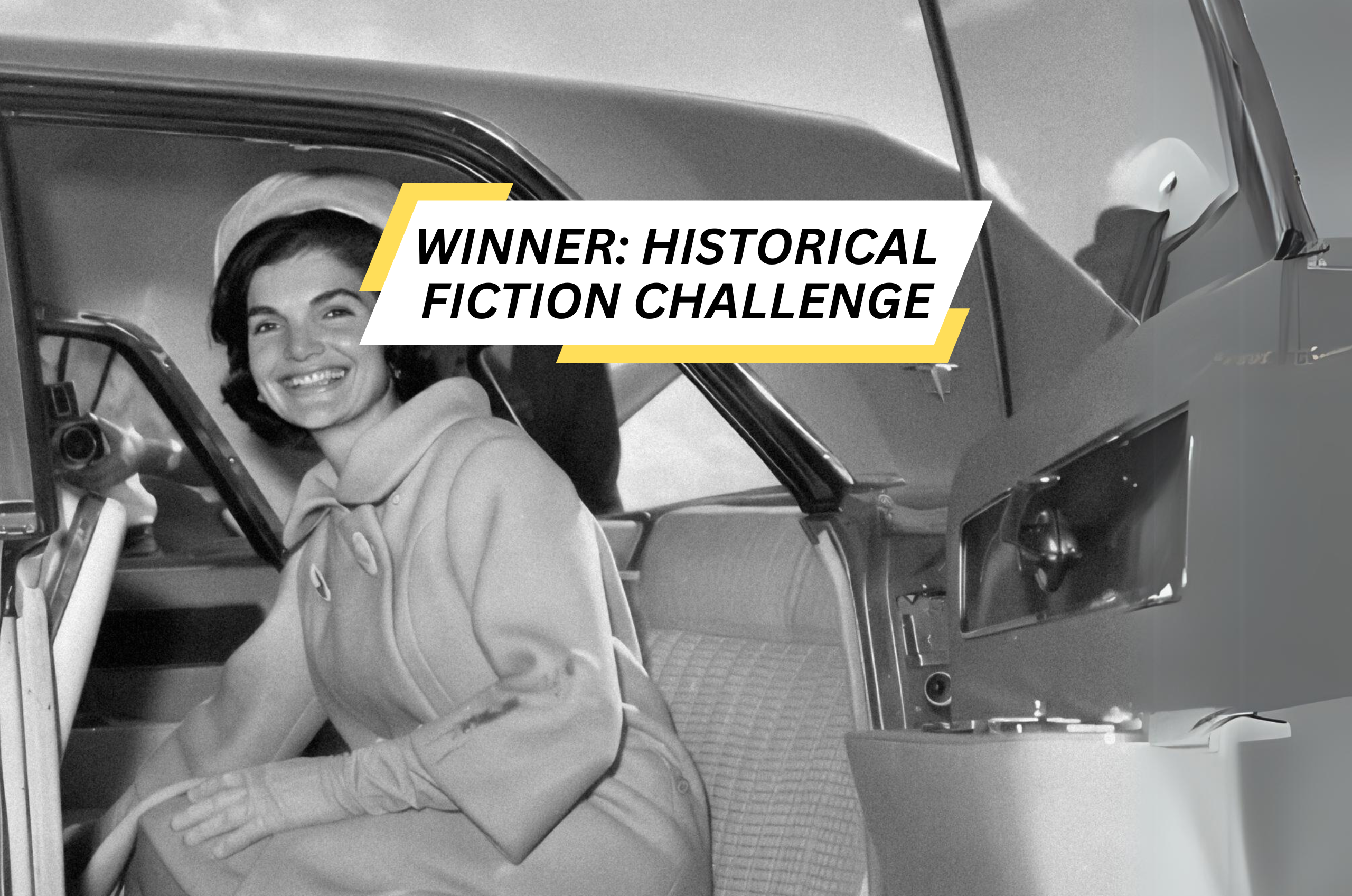Jackie Kennedy has been angry with her father ever since her wedding day. Still, she reluctantly agrees to meet him for lunch. He’s been indefatigable with his entreaties, and besides, she could use his advice. Leaving behind the Kennedy compound in Hyannis Port, where the newlyweds seem to be stuck for now, she takes the train into the city. As she climbs out of a cab at The Knickerbocker, another cab pulls up, and her father emerges, as dashing as ever, tanned and coiffed in a gray pinstriped suit, carrying his hat and walking stick.
“For heaven’s sake, let’s have a look at you,” her father says as he takes Jackie in from head to toe. His dark eyes are wide set like hers, a point of pride since the first time he pointed out the resemblance when she was a girl. “It’s been forever and a day since I’ve seen you.”
Jackie is so glad to see him that she lets the comment slide. At the wedding almost two months ago, she’d stood in the vestibule of Saint Mary’s wearing a fussy confection of a dress, waiting for her father, who’d had gray suede shoes custom-made for the ceremony, to show up and walk her down the aisle. Now, accustomed to her father’s exacting sartorial standards and craving his undivided attention, she unbuttons her wool coat to show him her bouclé jacket and matching skirt, both a deep aubergine. When he nods his approval, she lets out her breath, relieved.
“Next time, matching pumps,” he says. “But yes, to the saturated color. Now let’s get some lunch.”
Ever since her parents’ scandalous divorce when Jackie was ten, his lifestyle has been unpredictable. Sometimes, he serves cold sandwiches on a card table set up in his sitting room. Other times, he takes her out on the town. His nickname, Black Jack, refers as much to his sunlamp tan as to the time he spends gambling. And yet, through it all, she’s always loved how he seems to gild everything in his path simply by sweeping onto the scene.
Inside, the tables are covered in linen damask, the ceiling in billowing folds of mauve and cream fabric. The host pulls out her chair, and Jackie takes her seat, relieved to be inside where it’s warm. The napkins are folded into starched peaks like a bishop’s mitre. It’s almost a shame to undo all that careful work, but she does and places it on her lap.
Her father glances around checking to see if there’s anyone he knows. Normally bustling, the restaurant is only half-full. The cold, gray weather has kept people snug inside their houses. As a waiter drops off menus, Jackie waits for an apology from her father. His dark, wavy hair is neatly styled, his three-piece suit immaculate.
“Where’s Father?” she’d finally asked her mother at the church, clutching her bouquet, all that virginal pink and white, in front of her abdomen like an ineffectual shield.
“Forget about him,” her mother had hissed. “Last anyone saw, he’s sprawled on his bed at the Viking in nothing but his underwear.”
At the last minute, Jackie, so humiliated she might have been stripped naked herself, had been escorted down the aisle by Hughdie, her mother’s husband.
“I need your help with the Kennedys,” Jackie says. Her father still hasn’t apologized for leaving her with such a sorry substitute—and on her wedding day of all days. But apologies aren’t exactly his style, and if she wants any decent advice, she’s better off catching him before drinks arrive. “How do I convince them Jack and I need a place of our own?”
“Oh no, kitten, what’s wrong with the family compound? The drapery not up to snuff?”
Her father says the correct things—that she’s snagged the country’s most eligible bachelor, that the Kennedys, with their tousled hair and winsome smiles, are strikingly photogenic, that Jack, in particular, is destined for great things. And yet he pounces at any hint that they’ve fallen short of expectations.
“They’ve put us in Jack’s childhood bedroom.” Jackie isn’t sure why she hands her father this gift, except that she needs him to understand. “His boyhood adventure books on the shelves. A twin-sized bed.” Since they returned from the honeymoon in Acapulco, her nights with Jack have been a tangle of frustration. His sharp elbows jabbing at her ribs, his cold feet pushing hers aside for a scrap of blanket.
Her father’s pencil-thin moustache twitches as he tries to hide a smile. “Are Bobby and Ethel in the same humiliating boat?”
“They’ve got their own place. A separate house on the compound.”
“At the ambassador’s expense, I’m guessing.” He signals for the waiter and orders a Jameson on the rocks.
“I’m fine with water,” Jackie tells the waiter, prim and proper, then turns her attention back to her father. “I don’t know the details, but you’re probably right.”
“But Jack’s the heir. He’s the chosen one. Not Bobby.”
Outside, it begins to rain, a desultory drizzle that can’t work itself up into something more dramatic. As the rain trickles down the restaurant windows, it striates the view of canopied brownstones until they resemble sodden paintings. An Impressionist rendering ruined under the tap.
“Hard to say where I’d be if my brother Joe hadn’t been killed in the war,” Jack had said on one of their first dates. “You know what Honey Fitz—that’s my mother’s father—told the papers when Joe was born? ‘This child is the future president of the nation,’ he said. ‘He’ll be the first Catholic to hold the esteemed office.’”
“Bobby could run for office too,” Jackie says after they’ve placed their food orders. She sometimes wonders about the accident of birth order. Despite being the younger sister, Lee has always been the type to charge ahead, to know what she wants and seize it. “He’s more than capable.”
Black Jack rubs his hands together. “Now, there would be some fireworks. Get a little competition going. May the best man win and all that. Spice things up.”
Jackie shakes her head. “Bobby knows his place.” They all do, of course. That’s part of being a Kennedy. There’s an ingrained hierarchy and an unspoken set of rules. “He and Ethel have the house because of the children.” Three years younger than Jack, Bobby happened to marry first, and Ethel has been popping out babies ever since. Soon, everyone will expect the same from Jackie.
The waiter sets down steaming bowls of French onion soup. Somehow, her father has already drained his drink, and he orders another.
“Joe and Rose like to keep everyone as close by as possible.” Jackie shrugs. The truth is, she practically wilts beneath the Kennedys’ good-natured rowdiness. To get even a smidge of quiet, she escapes to the shore for solitary walks as often as possible. There’s this myth of the clan, the compound, the dynasty. Those who are left stepping into the shadows of the siblings who have died. Jack forever chasing the ghost of his departed big brother. His sister Eunice, for lack of anything of her own, slipping on Kick’s ghostly cloak.
“What does that charming husband of yours say about it?” Jackie’s father asks. Seemingly anxious for his second drink to appear, his gaze trails the waiter. He grinds the slightest bit of pepper on his soup, then lifts the silver spoon, takes a bite, and closes his eyes in pleasure. When he opens them again, they seem to flash, the blue irises more intense than usual. The whiskey is warming him, flushing his cheeks. “When you get a house of your own—if you ever do—you’ll have to snag a cook who can make soup like this.”
“Jack keeps putting me off, saying we’ll talk about it some other time.” Perhaps her new husband is afraid to live alone with her, just the two of them. Well, not afraid, exactly. But maybe he prefers to play the role of golden boy in the same boisterous household he’s always known. In the eyes of the household staff, Jack can do no wrong. His mother is always handing him newspaper clippings he might find interesting. His father spends his days at that vast mahogany desk of his, plotting how to get Jack into the White House. “My husband isn’t around much. He’s forever dashing off to Washington.”
Jackie’s father frowns even as the waiter sets down his drink. She’s afraid he’s heard the rumors about the leggy Swede. Immediately before the wedding, rumors swirled about Jack and Gunilla Von Post. Apparently, she’s a freckled blonde, quite the natural beauty. A twenty-one-year-old aristocrat. People say she and Jack were inseparable in Cannes. They joke it’s a miracle he dragged himself to Newport in time to recite his vows.
Before her father can repeat his tired refrain that all men are rats, Jackie reminds him she’s married a senator. “He has obligations, meetings to attend. Last-minute votes on pending legislation.” A vein in her father’s bronzed jawline pulses with concern as he swallows. “It’s not as though he’s jetting off to see another woman,” she adds, then immediately regrets it. She pushes away the rest of her soup.
Behind those patrician eyebrows of his, her father’s mind whirs. She can almost see it working, like flickers of a film across his forehead. He drains the remainder of his whiskey and rattles the ice in the glass. “When you do get a house, you can’t turn into a nag like your mother,” he says finally. “Trust me. That’s the surest way to send Jack running into another woman’s arms.”
“You sound as though you’re speaking from experience,” Jackie says, then snaps her mouth shut, appalled. She can’t meet her father’s eyes. Instead, she studies the damask tablecloth. The roses are gaudy, the trailing vines unruly. An awful, ragged silence opens between them, never mind the cadence of murmured conversations around the dining room and the restrained clink of forks against porcelain plates. When her father clears his throat, Jackie is certain he’ll issue a vehement denial—or chuckle in that nonchalant way of his as he brushes off her juvenile accusation.
Black Jack spreads his arms wide. It’s a confident, almost aggressive, gesture. He, too, can be a politician, a diplomat. His white teeth flash as he smiles. “Who better to advise you now?”
Jackie puts her hand up, although she knows she can’t stop him.
“My darling, it takes a rat to know a rat,” he continues. “Now, don’t look so shocked,” he says when she shudders. The soup she’s eaten rises at the back of her throat. “You’re what, twenty-three?”
“Twenty-four.”
“Old enough to have an inkling of how the world works.”
“I’ve heard the rumors, of course. Practically all my life I’ve heard them. Only I’ve never quite known whether they were true. Not until now.”
Her father laughs, but Jackie stares at him until he realizes she’s serious. The draped fabric on the ceiling, so much like an elegant circus tent, muffles the restaurant noise. She’s been naïve, of course she has. Or she’s pushed down any unpleasantness the best she could.
“Look, your mother never gave me a minute’s peace.” Defensiveness makes her father’s voice brittle. “No man wants to be harangued every minute of the day. Are you enjoying your soup? They use an aged gruyere here.”
“I don’t harangue Jack if that’s what you’re implying.”
He shakes his head. “Not at all what I meant, my dear.”
“You think I let him off too easily. But then you wag your finger about being a nag. There’s no way I can win.”
“Who’s wagging their finger?” He chuckles as he glances around the dining room again for anyone he might know.
The waiter takes their soup bowls away and promises to return soon with their entrees.
Before her father can order another drink, Jackie leans forward. “It doesn’t make any difference, not really. I’m only curious. Helen? What about Anne? Mildred?” She ticks off the names on her fingers. The women he’d been rumored to have bedded before and during the divorce. Family friends. Neighbors. Mothers of Jackie’s and Lee’s classmates.
“You can’t believe everything your mother says about me, Jacqueline.”
“Oh, it wasn’t just Mummy. Lee and I heard talk at school, at the stables, at the Maidstone Club. Everywhere really.” Although Jackie strives for a casual tone, she sounds shrill. After all these years, the embarrassment still stings.
“Your mother made life impossible.” He signals for another drink. “Nothing was ever good enough for her. You know how she can be.”
At the wedding, Jackie’s mother had begged her to keep her lips together when she smiled. “Your teeth aren’t as straight as might be considered ideal,” she’d said. “It’s easy enough, just a matter of remembering.” She had demonstrated a closed-mouth smile that failed to reach her eyes.
The waiter returns with shrimp salad on toasted sourdough. For a few moments, they eat in silence.
Growing up, when her mother didn’t have enough money for their household bills, she’d have to beg her parents to help. Jackie and Lee would come home from school to find her still in her housecoat, humiliated and ashamed, the icy blue satin stained with mascara.
Jackie places her fork and knife across the plate to signal that she’s finished, never mind she’s barely taken two bites. “So, let’s see if I’ve got this right. I’m new at this wife business and I don’t yet have children. But I’m getting advice from everyone. Talk to my husband, but only if I’m not bothering his work. Quietly and beautifully tend the children, who should themselves be quiet and, if not beautiful, at least tidy. Tell the cook to make his favorite dinner. Now that I think of it, the cook ought to be old and fat so I don’t discover my husband in bed with her. Is that the safest course?”
When Black Jack laughs, it feels like a slap. “Now you’ve got it exactly.”
Tears sting Jackie’s eyes as she nods. “Well. All right. Sure. I suppose it’s nice to get the benefit of someone in your own family with personal knowledge.”
Her father flicks open his cigarette case and slides one out. “When have you seen Lee?”
“Deft change of subject.”
“Well, have you met up with her?”
Jackie sighs. “Not since the wedding.” She and her sister get along, but they aren’t in each other’s pockets. “We spoke on the telephone last week, and she and Michael are thinking of moving to England.”
Her father takes a pull on his cigarette and exhales. “Why on earth would they do that?”
“You know how Lee is.” Jackie brushes her hand through the air like she can dismiss her sister. Lee has always been fearless, ambitious—almost greedy—but always, without fail, elegant and ladylike. Suddenly, Jackie wonders if she’s had Lee all wrong. Perhaps Jackie is too provincial, her life too small and tidy. Meanwhile, Lee’s vision is limitless. The world is her oyster, as they say.
“Your sister knows what she wants.” Black Jack runs his neatly-trimmed fingernail along the edge of his glass tumbler. “A new dress every week, the finest furnishings, significant jewelry. She’s an aesthete, one of the most discerning.” He offers Jackie a cigarette from his case, and she takes it and leans forward for him to light it. “She’ll hire the finest designer in London for their flat, I’m sure. Get the magazines in to photograph it before redoing it again.”
Lee seems to do nothing but spend her husband’s money. As for Jackie’s own ambitions, she was once an aspiring journalist, but of course, she gave that up when she and Jack got engaged. Now, she isn’t sure how she’s supposed to spend her days. “The phone bills will be enormous,” she says as she blows out smoke.
“Darling, I’m sure you two will still talk every chance you get.” His kind smile makes her forget, at least for a moment, the seediness of their earlier conversation and the childhood memories it conjured.
“Excuse me, sir.” The waiter bends down to show Jackie’s father the bill in its leather portfolio. “Your luncheon tab has been paid by an acquaintance. I wanted to let you know.”
“That’s odd.” Her father drops his cigarette butt into the ashtray and looks around the room again. “I don’t see anyone in my circle.” An elderly couple in the corner waves, and he nods in response.
“I believe they intended to extend their regards to Mrs. Kennedy. They mentioned having seen a recent magazine feature.”
Jackie stubs out her cigarette and straightens in her chair.
“Quelle bonne surprise.” Jackie’s father strokes his moustache.
Once the waiter retreats, Jackie reaches across the table and taps her father’s wrist. “It’s been nice to see you.”
Her father squeezes her hand. Once, twice, three times. Their signal for “I love you,” ever since she was a girl in saddle shoes.
On their way out, they stop by the couple’s table to say thank you.
The older woman grasps Jackie’s hand in her own. “You’re a bright star on your way up,” she says. “Positively luminous.”
Jackie’s father thrusts his own hand forward. “That’s what I’m always telling her.”
“You could be First Lady someday,” the woman continues. Her eyes on Jackie, she barely acknowledges Black Jack’s presence. “Not that anyone’s asking me, but that’s my two cents.” She gives Jackie’s hand another pat, and her husband nods.
“It’s awfully kind of you,” Jackie says. “I’ve not given such aspirations much thought.”
The older man tilts his head. “Perhaps you should. You’d be a breath of fresh air after that stodgy Mamie.”
Jackie smiles, trying to strike a balance between warm and patrician. “I suppose there’s plenty of time to consider what comes next—and thank you for lunch. That was awfully kind.”
Outside the restaurant, Jackie’s father is quiet. Despite the chill in the air, he leaves the belt to his cashmere coat untied, and it dangles uselessly at his sides. The rain splatters against the awning. Instinctively, Jackie pats her hair. It’s shellacked with hairspray, and yet she worries the rain will make it frizz up.
“That was a nice treat,” Jackie says. “To see you, I mean. Not what happened in there.” Before she slips on her gloves, she spins her engagement ring, a stunner from Van Cleef & Arpels, until the emerald flashes like an all-seeing eye. “What do you think makes a good First Lady in their estimation anyway? Smiling for a camera without looking bothered?”
“Such mindless prattle.” Her father twists his gloves into a knot rather than put them on. “I wouldn’t take it too seriously if I were you. Leave the scheming up to the Kennedys. They’ve got more than enough ambition for the rest of us put together.”
More money, too, Jackie thinks but doesn’t say. Not for the first time she wonders at how the Kennedys scrambled to put the wedding together so hastily, almost like Jack was a wild animal they hoped to tame.
“I suppose that nice couple saw the spread in Life Magazine,” she says. Her father-in-law is constantly arranging photo shoots. “Shall we get a cab?” They’d planned to do some shopping after lunch, make a day of it. “At least it wasn’t a complete disaster. It’s always so hard to know how pictures will turn out.”
Her father shifts on his feet. “You go ahead without me.” With a quick squeeze of her shoulder, he turns to go back inside the restaurant. Jackie stares after him. She wants to call out, but she won’t beg like a child.
Inside, Jackie’s father will order another drink, then another. If, at their next lunch, she tells him she and Jack are still stuck in his childhood bedroom, her father will say, “Oh kitten, what a shame,” and yet inwardly, secretly, rejoice.
Jackie could leave the rain behind and retreat back inside The Knickerbocker. She sees herself tapping her father on the shoulder and telling him about the first time she was called kitten. She was in grade school, spending every afternoon at the stables to escape the messiness at home. The slammed doors and shattered crystal meant for a lurid television drama, not real life. The sobbing and pleading from her mother, as though remonstrances might pin love in its place. The stable hands felt sorry for Jackie, the little girl in knee socks, her plaited hair in ribbons.
“She wanders around like a lost kitten,” one of them said to the other.
The rain, coming down harder now, pummels the road. She’ll talk to her husband tonight. He has ten million in his trust fund, and there’s nothing stopping Jackie from going out and finding a house for them. Even better, she might send the paperwork to her father-in-law, pretending it’s a foregone conclusion that he will pay.
She lifts her arm, and, despite the bad weather, a cab driver flashes his lights. Along the street two women hurry on their way, a third not far behind. If not for their clicking pumps, the way they hunch beneath their umbrellas, their nylons soaked through, they might be apparitions. They might be her mother’s old friends or mothers of Jackie’s classmates or mothers of Lee’s former beaus. Women her father bedded. Or they might be Jackie herself, the girl who loved horses and idolized her father, all grown up and living a different sort of ordinary life married to a stockbroker or a man in insurance or advertising.




